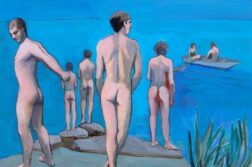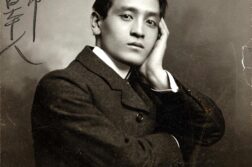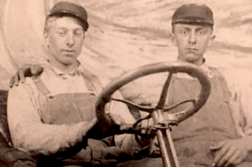I HAD a routine procedure a year ago in a famous New York hospital, a heart catheterization (when a wire is inserted up a vein into your heart to see if you have any blockages). My heart turned out to be fine but the wire apparently knocked loose some plaque, which brought on three small strokes in the pons, the top of the spine area, which controls many motor but not cognitive functions. Six months earlier I’d had a first, minor stroke of the same sort from which I’d thoroughly recovered in a week.
This time my partner Michael first noticed something was wrong when I was unable to swallow food or liquid. (I’d not eaten anything since midnight as the hospital had specified, and now it was early afternoon.) In addition I had a hard time speaking. I was in a recovery room with dozens of other patients, but nothing could be done for me until the surgeon came by to see me. He was held up by an emergency, apparently. Fortunately, an attractive young neurologist who was a fan of my writing, it seems, or at least knew who I was, became concerned. There’s a window of only several hours during which a clot-buster can be administered.
Finally, the flamboyant surgeon came by and ordered me to walk. When I couldn’t, he cried, “Where’s his walker? This man needs a walker!” Michael pointed out that I hadn’t had a walker when I came in. When the cute young neurologist mentioned the clot-buster, the surgeon pooh-poohed that idea. Luckily he was soon gone in a gust of cologne and expensive tailoring.
The neurologist gave me a CAT scan to see if there was any internal bleeding. There wasn’t, so the clot-buster seemed feasible. Even so, he warned me that if there were any undetected bleeding, I could have a hemorrhage and die. In a sort of reckless, devil-may-care way, I said I would take the risk. The clot-buster caused my gums to bleed. My partner said that I had “Joker mouth” (referring to Heath Ledger’s make-up in the Batman film).
I was then placed in the emergency ward for one night and in the stroke ward for two. I don’t recall much of that period. I had a barium test to see if I could swallow (until now all liquids had to be of nectar grade). I could. I was put through one of those loud, long bing-bong MRIs, which I couldn’t stand and quit halfway through. I do remember an efficient, heavily made-up social worker asking me if I wanted to be transferred to a neurological rehabilitation center, which would be covered by my very good insurance from my place of work, Princeton University. However, I’d have to be transferred in an ambulance, which I’d have to pay for out of my own pocket (about $900), even though it was only about a hundred blocks away. I remember with respect the two ambulance nurses, who treated me with kindness and matter-of-factness, though my wheelchair had to be forced up a steep ramp. Through the small back window I watched the sunstruck streets of Manhattan scroll past.
My insurance wasn’t that good, it turned out; I had to share a room with another patient, the two spaces partitioned only by a curtain that was always sliding open, like a troublesome skirt always riding up. My first roommate was a celebrated Korean instructor of martial arts who’d had repeated heart attacks and strokes and was in much worse shape than I. His wife, a cancer doctor, was always with him, speaking Korean and (I figured out because occasionally she would lapse into English) cursing him because he wanted to die. He was always making harsh hawking sounds as he cleared his trachea. His very filial daughter was constantly there, though his macho son came only once or twice. A whole row of his Korean disciples showed up, bowing deeply. Although he and I didn’t speak, we would wave to each other wanly when our wheelchairs passed each other in the hallway.
The rehab center was only a fifteen-minute walk from our apartment in Chelsea, and Michael came for hours and hours every day. I was so grateful for his attention but felt guilty about wasting so much of his time. When I was well before, I’d seldom visited friends in a hospital, saying that I had an “allergy” to sick people—which is about as forgivable as saying, “I don’t have black friends—just a preference,” as though preferences are distinguishable from prejudices. I’d lived through the worst AIDS years and sat by dozens of sickbeds, but always reluctantly. Now I couldn’t help noticing which friends showed up and which didn’t—but I didn’t blame the no-shows. We’re busy or we’re cowards or we lose track of time.
No one in the hospital loses track of time. Gratitude, not resentment, was my dominant emotion during my seventeen days in rehab. (By the way, when I posted on Facebook that I was in “rehab,” several of my druggy friends congratulated me for my honesty in admitting I had a “problem.”) Generosity—among characters on TV or in a sentimental article in People—would make me burst into tears. I had never been weepy, but now I felt as mushy as a redeemed criminal in a Dostoevsky novel. The psychiatrist on staff explained that a stroke could loosen the brakes on the emotions. “And you do have something to cry about,” he added.
I even felt grateful when Robert Silvers at The New York Review of Books “entrusted” me with a long, disjointed, theoretical, and nearly inscrutable book to review. I’m not sure Bob had any idea that I’d had a stroke, but I took the assignment as a vote of confidence—and started reading and annotating the difficult book, which I was barely strong enough to prop up.
The staff was wonderful. I finally saw a justification for Christians, since for once I wasn’t the target of their anti-homosexual hatred but was a beneficiary of their general compassion. Most of the nurses were from the West Indies. Many of them had been evangelized. The sweetest one was a Jehovah’s Witness or something whose father was a minister. She and I spoke French together, which made the other nurses giggle. My témoin de Jéhovah was forbidden to wear jewelry, but she was permitted to do beautiful, elaborate knotting to her hair. She would roll me from side to side as she changed my sheets, always joking and calling me her sweetheart or her baby, though I was neither. Since I couldn’t go to the toilet, she also had to help me on and off the bedpan. It should have been humiliating or infuriatingly infantilizing, but I was in no shape to be able to afford such reactions; I was grateful. I don’t think I’d ever been cold or proud, but now, like soldiers in the trenches, I began to think in some deep way that I was no better or worse than anyone else. Interchangeable.
The first few days I had to be lifted out of bed in an elaborate, mechanized contraption called a Hoyer Lift and deposited into a wheelchair. Eventually I learned to scoot myself from bed to chair across a wood plank. Once in the chair I was wheeled down to the gym, where two wonderful young women, one Chinese and one German, taught me to walk on crutches and in a walker as they followed me closely with the wheelchair. They held onto me and kept me upright. I remember looking enviously at a much older man (I’m 73) who was walking freely about in the normal way and I wondered if I’d ever be able to do the same.
The stroke had affected my right side, so many of the exercises were designed to strengthen my right arm (which I could barely move) and my right leg (which ached constantly). I thought longingly of all the spoiled-brat expensive massages I’d had in my life when I didn’t need them. Now that I was in constant if not severe pain, where were all those skilled hands? After a couple of weeks of physiotherapy I could finally take a perilous step. I could go up a flight of mock steps. I could even get into a mock car. I would need these car-entering and step-descending skills to get home.
On the same floor as the gym was a renowned clinic for children with orthopedic problems. I could see them through the glass door or in the hallways, bravely rowing themselves along on crutches or on improvised wheels while their fearful mothers crept behind them.
The food was so unappetizing that I lost seventy pounds, which I badly needed to shed. I went from morbidly obese to just fat. I’d always heard that overweight people were picky eaters, willing to gorge themselves only on the best. I was guilty of just that sort of gourmandise. I’d rather starve than eat badly.
For a while I was alone in my room, and I asked to be moved beside the window. The neural scientist husband of a friend of mine said that studies showed stroke patients got better if they were beside a window. “The sunlight is probably good for their spirits,” I said. “No,” he said, “it’s just the window. They get better if they have a window.”
For a while I had lots of visitors, and some of them were famous writers, though the nurses were most impressed when my generalist and my cardiologist visited me (“That’s very rare,” they whispered). I labored over my wretched review book. Michael brought me bills to pay and a checkbook, but all the hospital bills just made me anxious (I’d already run up several hundred thousand dollars), and I decided to wait a month or two and see what my insurance didn’t cover. Theatrical volunteers trooped past and sang songs with a guitar; one of my guests, a novelist, borrowed the guitar and sang a loud, exhilarating song he’d composed. A nice lady came by with a “therapy dog” that I was allowed to cuddle. My old shrink from years ago visited. Everyone sympathized with Michael and asked him with sotto voce urgency: “ But are you taking care of yourself?”
I had a speech therapist whom I teased for her appalling Australian accent—“Are you going to teach me to sound like that?”—but she was very professional and advised me I had to speak now with more emphasis, almost as if I were angry. My voice was soft and my breathing shallow; I had to practice breathing into a tube and raising a plastic bobble up to a certain point. My writing was unrecognizable at first, but I was determined to get my cursive and my typing back, and I wrote day and night. I finished a first draft of a Paris memoir that came out last January.
Suddenly I had a new roommate, who I figured out must be gay (he had a crush on my handsome partner). He had no insurance, but a rich lady friend was footing all his bills. She was also in constant attendance. He was six-foot-seven and just thirty, an ambitious golf pro who’d sunk all his money into a sports shop. He couldn’t afford insurance nor his blood pressure meds and had had a stroke after driving his car into a tree. The medics had had to saw off the top of his skull, which was sitting in a hospital freezer. He wore a football helmet now. He was convinced that enemies were piling on top of him and he shouted for us to get them off. He whined for hours for one particular male nurse. When the nurse finally came, he begged him to get him a bourbon and coke. (Was he going through DT’s? I wondered). His mother visited once, a very old French farm woman.
My roommate listened all night to loud, cheesy pop music. A friend brought me headphones and an FM radio tuned to a classical music station. Many nights I couldn’t sleep. I would look out at the Chrysler Building, its neon zigzags glowing in the dark.
Finally, Michael arranged what I called my “exit strategy.” He rented a limo that hovered at the curb. A guard wheeled me downstairs. I slid into the car as I’d practiced. Everything looked busy and bright. I walked down the three steps of my building on crutches as I’d rehearsed. A wheelchair had been folded and put into the trunk, but I never set it up, and two weeks later sent it back. I was on a walker.
I made a remarkable recovery, further helped by six months of out-patient physical therapy and the healthy meals Michael learned to prepare. I still walk with a cane and have a little trouble talking and swallowing. I live in dread of another stroke and take all my pills, monitor my blood pressure, have kept the weight off. I’m able to prepare every third meal (which I rehearsed in rehab). I don’t walk enough and I cancel too often on friends. Considering how social I used to be, I’ve become something of a recluse. But I did teach a full year at Princeton, though my partner accompanied me everywhere. Recently I flew to Tucson on my own to give a speech. I was proud of myself.
I was always a sybarite, given to sensual pleasures of every kind. Now I still have a lot of random sex for a man of 73, thanks to specialized internet sites. I take thirty pills a day. I’d given up smoking in 1982 and drinking in 1983, so at least I didn’t have those temptations to fight. I am still a gourmand. I travel a lot but with my cane, which helps me to board the plane first. I haven’t forgotten French and in early August participated in a literary conference in Provence and, in September, one in Paris. I’m writing a new novel.
I’d like to say I’m making better use of my time, but it’s only minimally true. I still take on too many assignments, still read too many unsolicited manuscripts by youngsters seeking blurbs, still write too many ephemeral pieces (like this one). My new novel is waiting for me to get back to it; people say it’s my best in years.
Edmund White’s memoir, Inside a Pearl: My Years in Paris, has just been published by Bloomsbury USA.





